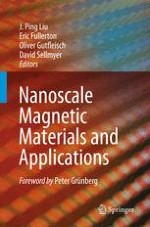2009 | OriginalPaper | Chapter
12. High-Temperature Samarium Cobalt Permanent Magnets
Author : Oliver Gutfleisch
Published in: Nanoscale Magnetic Materials and Applications
Publisher: Springer US
Activate our intelligent search to find suitable subject content or patents.
Select sections of text to find matching patents with Artificial Intelligence. powered by
Select sections of text to find additional relevant content using AI-assisted search. powered by
